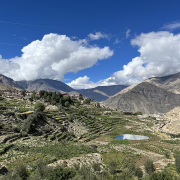Stanford Researchers Explore Potential of Himalayan Black Peas
Stanford University researchers published a study in Science Advances on the genetic diversity, ecological resilience, and dietary value of black peas. The black peas lack a scientific name but are grown locally in the high-elevation desert region of the Trans-Himalayas and an integral part of traditional recipes, such as soups and hot drinks. The peas are known for their nutrition and sustained energy, as well as for their ecological resilience, low water use, and the ease with which they can be grown. Compared to green peas, black peas are richer in protein and high in minerals like magnesium, calcium, and iron. The peas are also a significant source of fiber and vitamins C, B1, and B3. The study authors emphasize that black peas could be a valuable genetic reservoir as a potential wild relative that could enhance other crops, equipping them to withstand increasing heat and drought stress.

 Harman Jaggi, Stanford University
Harman Jaggi, Stanford University Kiss the Ground
Kiss the Ground
